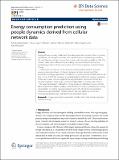| dc.contributor.author | Bogomolov, Andrey | |
| dc.contributor.author | Lepri, Bruno | |
| dc.contributor.author | Larcher, Roberto | |
| dc.contributor.author | Antonelli, Fabrizio | |
| dc.contributor.author | Pianesi, Fabio | |
| dc.contributor.author | Pentland, Alex Paul | |
| dc.date.accessioned | 2016-06-27T20:17:32Z | |
| dc.date.available | 2016-06-27T20:17:32Z | |
| dc.date.issued | 2016-03 | |
| dc.date.submitted | 2015-11 | |
| dc.identifier.issn | 2193-1127 | |
| dc.identifier.uri | http://hdl.handle.net/1721.1/103363 | |
| dc.description.abstract | Energy efficiency is a key challenge for building sustainable societies. Due to growing populations, increasing incomes and the industrialization of developing countries, the world primary energy consumption is expected to increase annually by 1.6%. This scenario raises issues related to the increasing scarcity of natural resources, the accelerating pollution of the environment, and the looming threat of global climate change.
In this paper we introduce a new and original approach to predict next week energy consumption based on human dynamics analysis derived out of the anonymized and aggregated telecom data, which is processed from GSM network call data records (CDRs). We introduce an original problem statement, analyze regularities of the source data, provide insight on the original feature extraction method and discuss peculiarities of the regression models applicable for this big data problem.
The proposed solution could act on energy producers/distributors as an essential aid to smart meters data for making better decisions in reducing total primary energy consumption by limiting energy production when the demand is not predicted, reducing energy distribution costs by efficient buy-side planning in time and providing insights for peak load planning in geographic space. | en_US |
| dc.description.sponsorship | Telecom Italia SpA | en_US |
| dc.description.sponsorship | SET Distribuzione SpA | en_US |
| dc.publisher | Springer Berlin Heidelberg | en_US |
| dc.relation.isversionof | http://dx.doi.org/10.1140/epjds/s13688-016-0075-3 | en_US |
| dc.rights | Creative Commons Attribution | en_US |
| dc.rights.uri | http://creativecommons.org/licenses/by/4.0/ | en_US |
| dc.source | Springer Berlin Heidelberg | en_US |
| dc.title | Energy consumption prediction using people dynamics derived from cellular network data | en_US |
| dc.type | Article | en_US |
| dc.identifier.citation | Bogomolov, Andrey, Bruno Lepri, Roberto Larcher, Fabrizio Antonelli, Fabio Pianesi, and Alex Pentland. "Energy consumption prediction using people dynamics derived from cellular network data." EPJ Data Science 5:13 (2016), pp.1-15. | en_US |
| dc.contributor.department | Massachusetts Institute of Technology. Media Laboratory | en_US |
| dc.contributor.mitauthor | Pentland, Alex Paul | en_US |
| dc.relation.journal | EPJ Data Science | en_US |
| dc.eprint.version | Final published version | en_US |
| dc.type.uri | http://purl.org/eprint/type/JournalArticle | en_US |
| eprint.status | http://purl.org/eprint/status/PeerReviewed | en_US |
| dc.date.updated | 2016-05-23T09:38:09Z | |
| dc.language.rfc3066 | en | |
| dc.rights.holder | Bogomolov et al. | |
| dspace.orderedauthors | Bogomolov, Andrey; Lepri, Bruno; Larcher, Roberto; Antonelli, Fabrizio; Pianesi, Fabio; Pentland, Alex | en_US |
| dspace.embargo.terms | N | en_US |
| dc.identifier.orcid | https://orcid.org/0000-0002-8053-9983 | |
| mit.license | PUBLISHER_CC | en_US |
